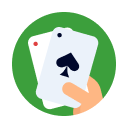R
rumsey182
Rock Star
Silver Level
lots of points so ill address them individually.
1/ you failed to address why we should assume that the calling range on a representative player in this player pool will call sufficiently wide enough to make nash shoving better than exploitably wide shoving.
Your kind of right,.. but not really. The blinds count in EV, but that is already part of the equation. What happens is range vs range in a frequency sense it is at worst neutral (neither can increase their EV above 0 if both know each others strategy). Your thinking in a hand vs hand situation, and yes you will have hands be +ev but in a true unexploitable situation when you are shoving correctly and they are calling correctly it is neutral. This is the value of it, because if you could tell someone what you are doing and it can't help them to be profitable, it makes your position powerful. This kind of ties back into what i said as it sort of being like a freeroll,.. it isn't exactly a freeroll but it is the closest example I could think of2/ if he calls optimally he will be +EV, both players will be. owing to the fact there is money in the pot. his worst calling hand will be indifferent between calling and folding meaning the equity of the two will be equal, given folding is 0 EV. therefore his expectation must be positive or he would be indifferent between folding all hands.
you can not make any assumptions in a vacuum, which is what we are in. I'm guilty in another thread (KQo wanting to call a 3 bet OOP) of actually making assumptions without having the ability of doing so. No info means we have to assume nothing ( which is when nash is optimal)3/ I am aware of what a nash equilibrium is, I am a masters student studying economics. your assumption about nash being optimal is fundamentally incorrect. provided there are identifiable player pool tendencies it would be optimal to construct a representative agent and make exploitable plays against that model. or better yet we could weight that model appropriately with different calling ranges and create an aggregate.
yes but the folding is negative because of the overlay in the pot4/ let me hammer this point home, this is not a a bluff/nuts v bluff catcher situation. the calling ev is definitely not 0. if it were zero, they could increase their profit by calling with less hands. and the consequence is to imply that they are indifferent between folding 100% and calling nash, which is patently absurd when their range is uncapped and they could choose to call with only KK+ and show (an admittedly infrequent) yet clear profit.
i agree, but we can't assume this, we must establish what an unexploitable range is and make adjustments when we gain info5/ just because you shoved a nash range does not mean it was optimal, assuming the representative player calls too tightly, which seems a very very very conservative assumption to make, that means that we are folding hands that have a positive expectation when shoved.
Poker is a game of limited information, you may honestly never be able to truly "know" anything simply because you need repeated times of being in the same situation to test any hypothesis we do develop about someones tendencies. We are not guaranteed of this more so in MTTs. Least in cash games we have a lot better chance of someone staying for a few hundred hands and or we have a chance of playing against the same people with the same stack sizes many times.
When we can't know anything, we have to basically attempt to assume more or less that the villain will basically know what we are doing as a default. We can make some mild assumptions, but you simply can not make assumptions about someone in a vacuum.
Making assumptions about the "population" of what you are playing is somewhat unreliable as well, we simply do not have a good chance to play the same representative sample of the true population enough times to make our confidence in these assumptions.
Your right that generally people do not call enough in allin situations like this, but from an academic stance you can not assume such. In any situation in poker you can put yourself into a guessing game, but i would not recommend this unless you have a LOT of experience. Most people need to be focusing on more important things anyways, but teaching against a worst case scenario is ideal with lack of info.
Sorry TLDR but I'm sort of agreeing with you but you can't make any assumptions in a vacuum ( and it is good to teach the mechanics of how you avoid assumptions because it leaves room for people to fill in with there own info)


